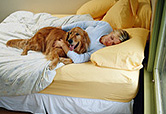THURSDAY, Jan. 20 (HealthDay News) — You might want to think twice before snuggling in bed at night with Fido or Fluffy.
 Sleeping with or being licked by dogs or cats can be conduit for disease, experts warn.
Sleeping with or being licked by dogs or cats can be conduit for disease, experts warn.
According to a report published in the February issue of the public health journal Emerging Infectious Diseases, seemingly healthy pets can carry parasites, bacteria or viruses that cause mild to life-threatening illness in people.
Of the 250 zoonotic diseases — infections transmitted between animals and people — more than 100 are derived from domestic pets, said veterinarian Dr. Bruno Chomel, report co-author and professor of zoonoses at University of California School of Veterinary Medicine at Davis.
Even though disease transmission is low in comparison to how many people sleep with their pets — more than half of all U.S. pet owners — Chomel said the risks are still there.
“Having a pet in the bed is not a good idea,” he said.
In one case a 69-year-old man, whose dog slept under the covers with him and licked his hip replacement wound, came down with meningitis. Another incident involved a 9-year-old boy who got plague, a potentially deadly bacterial infection, from sleeping with his flea-infested cat.
Other infections transmitted to people after sleeping with their cat or dog, kissing them or being licked by the pet include: hookworm, ringworm, roundworm, cat scratch disease and drug-resistant staph infections, the report said.
While people need to be aware that it’s possible to get sick from a pet, the health benefits of ownership far outweigh the risks, said Dr. Peter Rabinowitz of the Yale School of Medicine and co-author of the text book Human-Animal Medicine: Clinical Approaches to Zoonoses, Toxicants and Other Shared Health Risks. Research has shown that besides offering psychological support and friendship, pets help to lower blood pressure, increase physical activity, reduce stress and lift owners’ spirits, among other things.
However, he said, people with weakened immune systems are at greater risk for getting an infection from an animal. These include the elderly, children younger than 5 years, people with HIV/AIDS and cancer patients.
Owners can stay healthy by practicing good hygiene habits, which include washing hands with soap and hot water after handling pets, especially puppies, kittens or any aged cat or dog with diarrhea. Those “high-risk pets,” he said, are more likely to harbor an infection that could be passed to people. Also, immediately wash any area licked by a pet.
To prevent and catch illnesses early, keep animals free of fleas and ticks, routinely de-worm them and have them regularly examined by a veterinarian, the report advises. The authors also discourage owners from kissing their cats or dogs and sharing a bed with them.
Because most zoonotic diseases are under-diagnosed or not reportable to health authorities, Rabinowitz said no one really knows how many cases occur each year. However, he suspects several million infections are passed between pets and people annually in the United States, ranging from self-limited skin conditions to life-threatening systemic illnesses.
“We think there are probably a lot of infections that happen and nobody really figures out that it came from the pet,” said Rabinowitz, program director of the Yale Human Animal Medicine Project.
In recent years, an initiative called “One Health” — whose supporters include the American Medical Association, the American Nurses Association and the American Veterinary Medical Association — has pushed for better communication and collaboration between doctors and veterinarians. Approximately 60 percent of all human pathogens are zoonotic, according to the U.S. Centers for Disease Control and Prevention.
Just this week the president of the American Medical Association spoke at a veterinary conference in Orlando, Fla., about the importance of unifying the health professions.
“It’s not only animals giving infections to people, it looks like people can infect animals, too,” said Rabinowitz, citing a case where a domestic shorthaired cat in Iowa contracted the H1N1 virus from its owner. “It’s a two-way street.”
More information
To find out more zoonotic illnesses, head to the U.S. Centers for Disease Control and Prevention.
SOURCES: Peter Rabinowitz, M.D., associate professor, medicine, Yale School of Medicine and program director, Yale Human Animal Medicine Project, New Haven, Conn; Bruno Chomel, D.V.M., Ph.D., professor, population health & reproduction, University of California School of Veterinary Medicine at Davis, Calif; Emerging Infectious Disease, February 2011
Copyright © 2011 HealthDay. All rights reserved.
![]()
